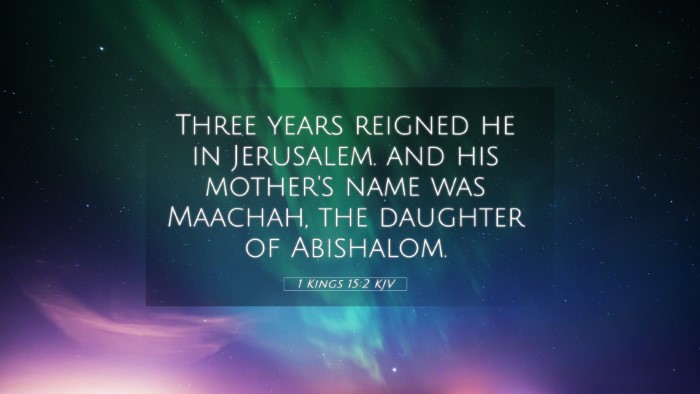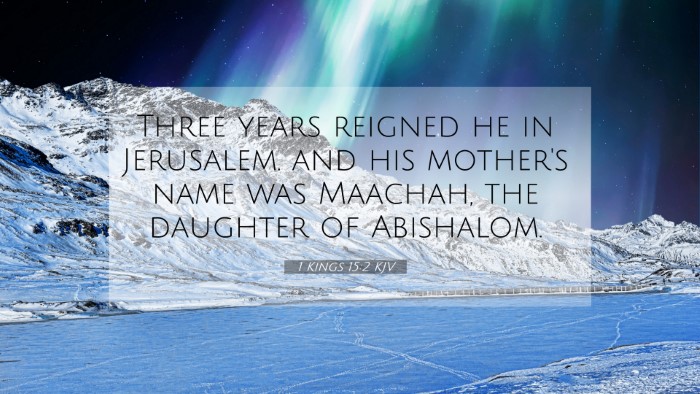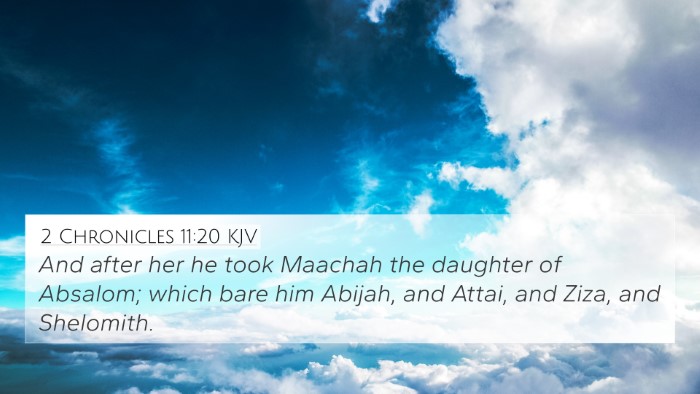Understanding 1 Kings 15:2
This passage states: "And he reigned three years in Jerusalem. And his mother’s name was Maachah, the daughter of Abishalom."
Overview of 1 Kings 15:2
The verse serves as a brief introduction to the reign of King Abijam (or Abijah) of Judah. It highlights the duration of his kingship and identifies his mother, linking her to notable lineage.
Commentary Insights
-
Matthew Henry's Commentary:
Henry emphasizes the significance of the lineage of Abijam, indicating that his mother's identity is not just incidental but represents the lineage of David and its implications for the Davidic Covenant.
-
Albert Barnes' Notes:
Barnes points out the three-year duration of Abijam's rule as relatively short and suggests that it is indicative of the troubled times within the kingdom, reflecting the moral and spiritual state of Israel during his reign.
-
Adam Clarke's Commentary:
Clarke elaborates on the mother's name, Maachah, who is linked to the royal family and suggests a divide between her influence and Abijam's character, pondering on the impact of maternal lineage in the context of spiritual leadership.
Thematic Connections and Cross-References
This passage connects to themes of legacy, leadership, and familial influence in biblical narratives. Here are relevant connections and cross-references:
- 2 Chronicles 13:2: Details about Abijah's kingship and how his reign is viewed in relation to the kingdom of Israel.
- 1 Kings 14:31: Identifies Abijam's royal lineage and contextualizes his reign within the broader narrative of the kings of Judah.
- Matthew 1:12: The genealogy of Jesus Christ includes Abijam's lineage, establishing important biblical connections through family trees.
- 1 Samuel 8:5: The desire for a king leads to the establishment of a monarchy, setting the backdrop for Abijam's reign.
- 2 Kings 15:1: Discusses the events surrounding the reigns of Judah’s kings also reflecting the chaos in the broader narrative.
- Luke 3:33: The genealogy of Jesus also includes this line, tracing the implications of Abijam's lineage through history.
- Jeremiah 22:30: Discusses the importance of royal lineage and its consequences on the fate of the kings of Judah.
Exploring the Length and Impact of Reign
Abijam's three-year rule raises questions on the effectiveness of his kingship. It invites reflection on the books of 1 and 2 Chronicles, where more details about the kings’ relationships with God are often provided.
Practical Applications and Reflections
Reading 1 Kings 15:2 encourages believers to consider the importance of one's lineage and the potential influence of family background on personal governance and integrity.
Moreover, it exemplifies the importance of drawing connections between various Bible verses as a means of understanding the deeper, interconnected themes within Scripture.
Conclusion
This examination of 1 Kings 15:2, enhanced by cross-referencing with other related Scriptures, enriches our understanding not only of the passage itself but also of the legacy of those within biblical history.





